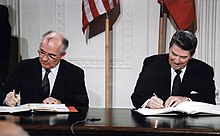disarmament
Disarmament refers to the unilateral ( unilateral ) or - by two ( bilateral ) or several ( multilateral ) states - agreed reduction of military potential ( soldiers , weapon systems ). The ideal long-term goal would be the complete abolition of military resources in order to curb or completely exclude the use of force between states. Disarmament is intended to promote the implementation of the prohibition of violence under Article 2 (4) of the Charter of the United Nations (there is no obligation to complete disarmament). In another fuzzy language Disarmament also includes the arms control (arms control), dealing with their relation to the stability of nuclear deterrence , however, substantially different from the older notion of disarmament and does not share the negative view of armor.
Disarmament in reality
In most of the so-called disarmament talks, however, it was and is not so much a question of reducing existing capacities, but rather of arms control or arms restrictions . This mutual control is intended to allow the construction of certain weapons such as B. prevent nuclear medium-range missiles .
The idea of disarmament developed under the conditions of deterrence policy during the Cold War . Real opportunities for disarmament arose particularly in the end of the Cold War between NATO and the Warsaw Pact . Against the background of demonstrations with several hundred thousand people for disarmament and against the arms race , one of the few examples of actual disarmament took place: the INF Treaty of 1987, with which medium-range missiles were bilaterally abolished by the Soviet Union and the USA .
The economic consequences of disarmament are often seen as a problem in connection with disarmament. States with a highly developed arms industry are difficult to persuade to convert arms . On the other hand, a “disarmament” or “ peace dividend ” is expected due to the savings in armament expenditure.
International agreements on disarmament and arms limitation
- The 1987 INF treaty : complete disarmament of medium-range missiles
- START II contract
- CFE contract
Disarmament as a demand for peace movements
The international peace movement has been calling for global disarmament, international arbitration and efficient international law since the 1880s . This catalog of demands has also been part of Catholic social teaching since 1917 (Pope Benedict XV ). There were numerous activities between 1918 and 1933 (see here ); In 1920 the Geneva-based League of Nations began its work. It is considered to be an indirect, historical precursor of the United Nations (UN) . At no time did all the major and central powers belong to it permanently (never so the USA; the German Reich (only from September 8, 1926 to October 14, 1933), Italy, the Soviet Union (1934–1939) and Japan only temporarily).
The League of Nations had a year-long conflict with the German Reich: after the empire had carried out the disarmament imposed by the Versailles Treaty, it refused to undertake any further-reaching disarmament efforts required by the League of Nations. The German Reich wanted his disarmament measures based on the Versailles Treaty to be credited towards general disarmament, which the League of Nations refused. The result of this conflict was that disarmament did not continue. The German Reich secretly made some armaments efforts in the 1920s (see here ).
After 1945, during the Cold War, numerous proxy wars were waged.
In the course of the fight against terrorism and brutal civil wars , doubts about pacifism are being raised , and at the same time there is growing acceptance of a gradual structural change in the military to a kind of world police . The type of conventional war between nations has appeared much less frequently since 1989 - the year the Iron Curtain fell and the Cold War ended.
literature
- Jost Delbrück (Ed.), Disarmament, War Prevention, Arms Control , Kehl / Strasbourg 1983.
- Institute for International Politics and Economics of the GDR (ed.), Documents on Disarmament 1917–1976 , State Publishing House of the German Democratic Republic, Berlin 1978.
- Stockholm International Peace Research Institute, World Armaments and Disarmaments , SIPRI Yearbook, Stockholm (annually).
- Ulrich Albrecht Disarmament (pdf), in: Historical-Critical Dictionary of Marxism , Vol. 1, Argument-Verlag, Hamburg, 1994, Sp. 37–41.
Web links
- www.ifsh.de/IFAR/index.htm - Website of the Interdisciplinary Research Group on Disarmament, Arms Control and New Technologies (IFAR)
Individual evidence
- ^ A b Rudolf, Peter: Disarmament in: Nohlen, Dieter; Schultze, Rainer-Olaf: Lexicon of political science. Theories, methods, terms , 2nd edition (2004)
- ↑ See Gaudium et spes, No. 82: Bellum est omnino interdicendum ; the war should be completely prohibited.
